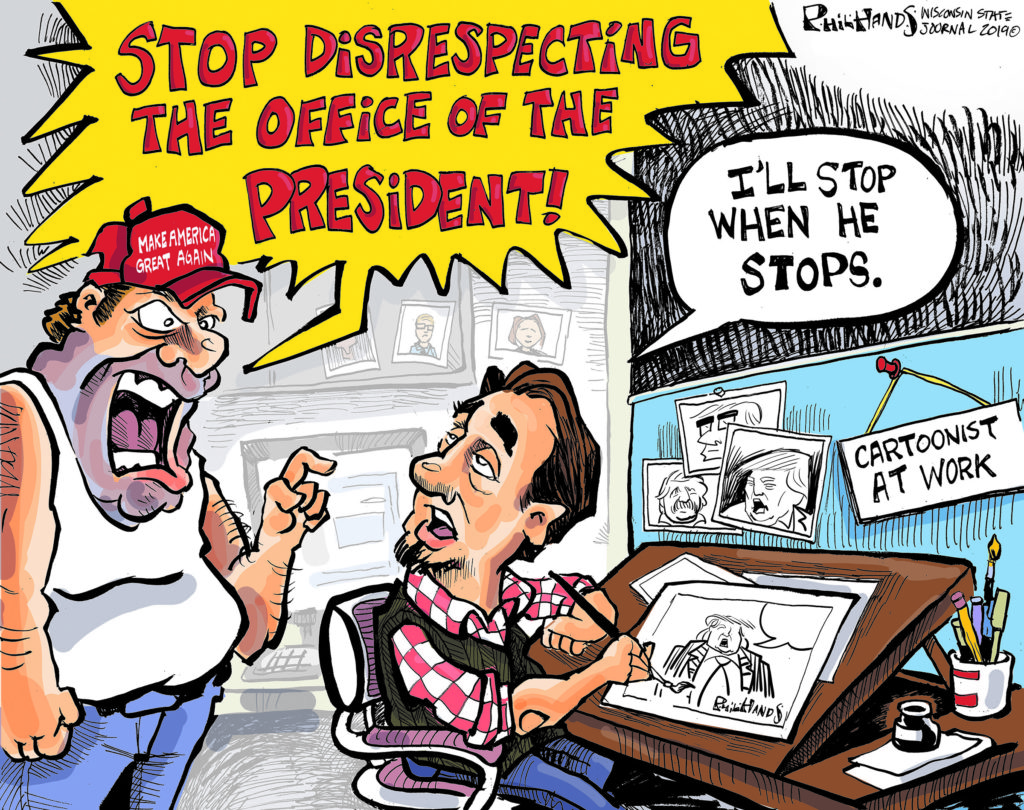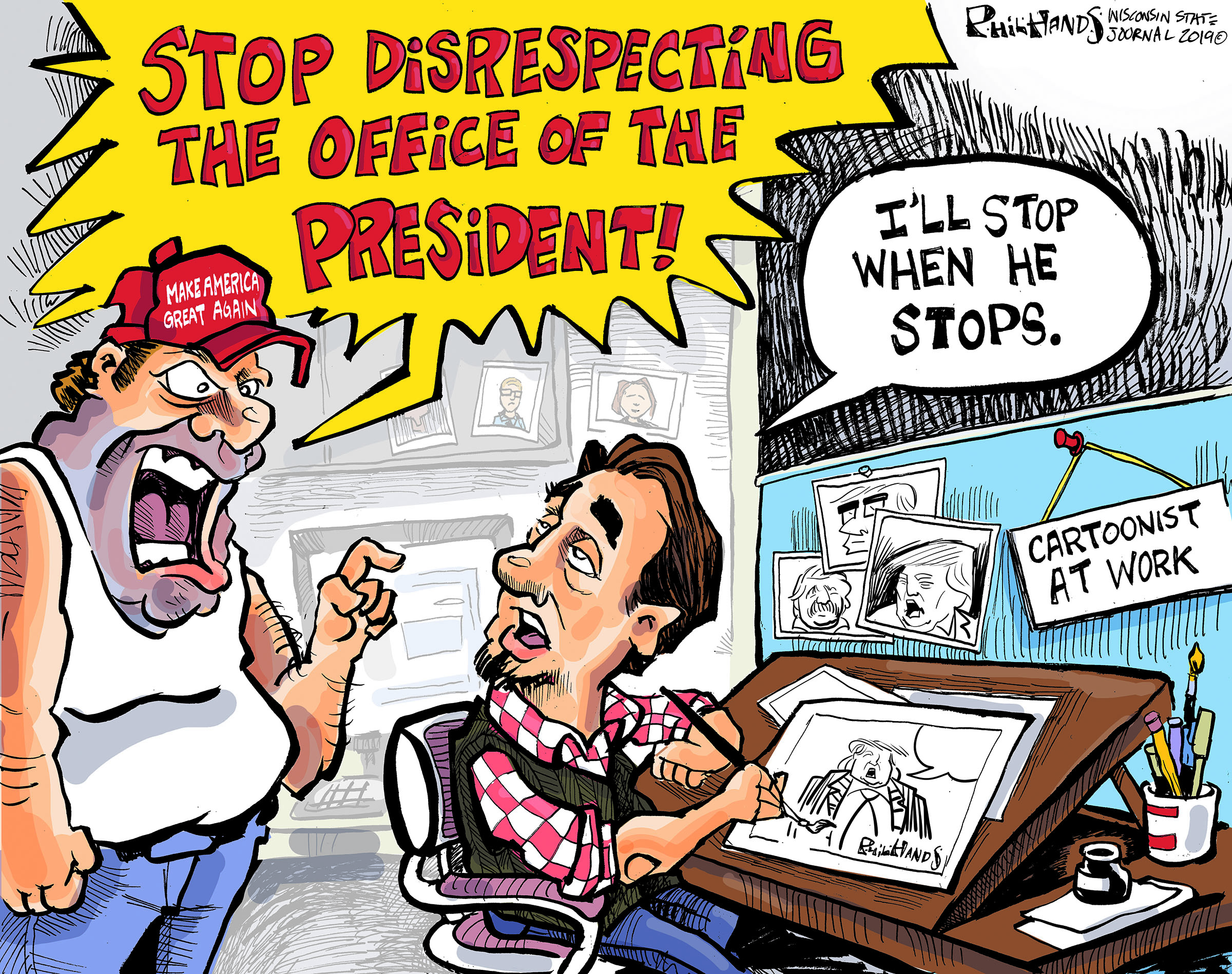Phil Hands is either “a moron” or “brilliant,” depending on what he draws. The nationally syndicated editorial cartoonist at the Wisconsin State Journal in Madison regularly pokes fun of President Donald Trump. The progressive readership in equally progressive Madison eats it up.
But Hands often hears from Trump supporters elsewhere in the country who don’t agree with his take on national news.
“I get hate mail from people of cities that I’ve never heard of in the South,” he says.. “I’m like I don’t know where that is, but whatever.”
Madison’s progressives can get upset too if Hands draws about over-the-top liberals. “They’re very tolerant of everything until it disagrees with them,” he says.

Hands recently talked about his work with GJR.
What type of content seems to go over well in Madison?
People really like it when I make fun of Donald Trump. It’s a pretty liberal community here in Madison, so people always really love that. People always loved it when I when I would make fun of Scott Walker, the old governor of Wisconsin, and I get the most pushback when I make fun of how liberal people in Madison are. So I often like to say Madison is going over the top being ridiculous with policy or a suggestion, and that really gets people in Madison riled up. They don’t like being criticized. They’re very tolerant of everything until it disagrees with them.
Do you get feedback about your cartoons?
A reasonable amount; yeah, I get it. Most cartoons generate an email or two, sometimes we’ll get a phone call from somebody telling me what a moron I am or how brilliant I am. I get a lot of comments on social media and Facebook, people sharing and commenting or writing about my cartoons or topics. But I am syndicated now nationally, so my cartoons appear in papers all across the country. So I get hate mail from all over the country nowadays as well, which is nice. I get hate mail from people of cities that I’ve never heard of in the south. I’m like I don’t know where that is, but whatever.
How long have you been drawing editorial cartoons?
I started drawing political cartoons at a small newspaper called Grosse Pointe News when I was in high school when I was 16-years-old. I was doing a weekly political cartoon for them about local politics and current events. I moved to Madison when I was 25 to graduate school here at UW Madison, and at the same time was drawing freelance cartoons basis for the State Journal and the Grosse Pointe News at the same time at that point. Then I sort of became a full-time cartoonist here for the State Journal in 2013. So I’ve been employed by the State Journal exclusively to draw cartoons for the last five years, but I’ve been drawing on a freelance basis for the last 13 years.
How often do you draw cartoons for the paper?
It’s not more of a daily thing, it’s usually I’m drawing between three or four a week at the State Journal. I also am in charge of editing all the letters to the editor and serve [on] the editorial board here, too.
How did you originally get into drawing cartoons back in high school?
Well I’ve always had a passion for drawing cartoons, and I wanted to draw a comic strip like Calvin and Hobbes. That’s what I really wanted to do, but then I sort of just fell into [it]. The Grosse Pointe News was looking for somebody to draw editorial cartoons for them and I was a 16-year-old dumb kid who was like “Hey, I can do that for you.” And they gave me a shot and the rest is history. I sort of realized that you know political cartoon was actually a really good fit for me because I loved drawing, but at the same time I really like saying something and you know using both sides of my brain to sort of be analytical about current events and then create art about them. So it’s kind of a nice bit for me.
How do you choose the types of topics that you cover in your cartoons? Do you cover multiple topics at once?
Sometimes I will take two different topics and sort of hybrid them together. I love to take national topics about what’s going on in Washington D.C. and give them a twist for my audience here in Madison, Wisconsin, that sort of relates to what’s going on in Madison or in the rest of the state. But oftentimes, I just sort of say “What’s the most important thing happening today? What do I care about the most?” And that’s sort of what I choose. I like to do a balance of cartoons that are about what’s going on in the state of Wisconsin and what’s going on at the national level. I try and draw at least one cartoon that’s about local politics every week.
How do you maintain your skill of drawing?
I probably ought to do much better than I do. I think nowadays, unfortunately, I don’t really draw much beyond sitting down to draw political cartoons. I really should be sketching more often than I do, but I often just sit down and draw a cartoon. I’m busy doing other things nowadays. I have two young kids. I’m pretty involved in my community here. I just draw whatever I feel like for that day for my cartoon.
When you have an idea, how long does drawing a cartoon usually take from start to finish?
Around two hours, once I have the idea. Getting the idea can be the hard part; figuring out how you’re going to say what you want to say is really the hardest part about drawing a political cartoon. I think I’ve been drawing for so long that once the idea is formulated, I rarely ever get stuck on the drawing part. It’s the creative process where you’re figuring out how it works that often trips me up.
What is the editing process for your cartoons?
The way my creative process works is I create a bunch of sketches of ideas that I have and I usually discuss them with my editor. Sometimes it’s pretty clear cut what we want to do for the day. If he doesn’t approve something, it’s because he doesn’t find it particularly funny, or maybe it’s sort of isn’t really accurate. It’s not usually because he doesn’t agree with my opinion. I’m not edited very heavily on what my opinion is; it’s just mostly about whether it’s funny.
Alexandra Martinez is a correspondent for Gateway Journalism Review based in Madison, Wisconsin, where she currently is working as a design intern. She is a student at the University of Kansas.

https://ipn.md/ru/%d0%b2%d0%be%d0%b9%d0%bd%d0%b0-%d0%b2-%d1%82%d0%b5%d0%bd%d0%b8-%d1%81%d0%b5%d1%80%d0%b2%d0%b5%d1%80%d0%be%d0%b2-%d0%ba%d0%b0%d0%ba-%d1%80%d1%83%d1%81%d1%81%d0%ba%d0%b0%d1%8f-%d0%ba%d0%be%d0%bc%d0%bf/
Can you be more specific about the content of your article? After reading it, I still have some doubts. Hope you can help me.